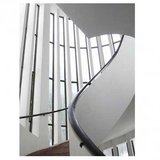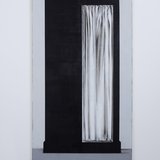|\| ART BLOG HUMOR BLOG PHOTO BLOG CULTURE BLOG |:| FOR THE RENAISSANCE MAN & THE POLYMATH WOMAN |/|
Friday, May 13, 2016
Living With Art | How Art Can Add Light and Space to Your Home (No Construction Required)
Living With Art
How Art Can Add Light and Space to Your Home (No Construction Required)
By Dylan Kerr
March 29, 2016
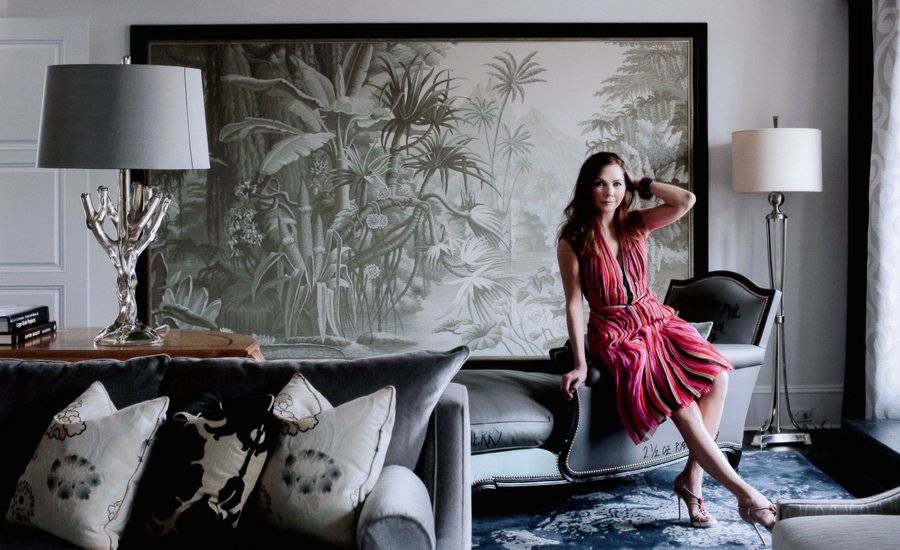
Rottet Studio Founding Principal Lauren Rottet
With a client list that includes impressive names like Rolex, Sony, Hilton, and Saatchi, the architects and designers of the Houston-based Rottet Studios are not only used to working big, but also working smart. It’s how Founding Principle Lauren Rottet built her business into the international powerhouse it is today, with offices from New York to Shanghai and a litany of awards and accolades including a recurring spot in Interior Design magazine’s Top 100 Design Giants.
In this special feature with Artspace, the Rottet team looks to the Light and Space movement as they tell us how savvy collectors can fill their homes with beautiful artworks while also adding a sense of expansiveness to any room through intelligent placement decisions. Read their advice if you’re interested in opening up your space without taking down a wall or adding a window.
IT'S ALL ABOUT LIGHT AND SPACE
"As designers, we strive to transport the occupants of any space into a new environment by eliciting an emotional response from their surroundings—all complimented by carefully curated works of art. Our decision to focus on 'Light and Space' refers to the influence the Light and Space artists have had in Lauren’s work. As a result of this inspiration, Rottet Studio is always exploring ways to make interior spaces expansive beyond their actual physical parameters and kinetic enough that one doesn't become bored in them day after day."
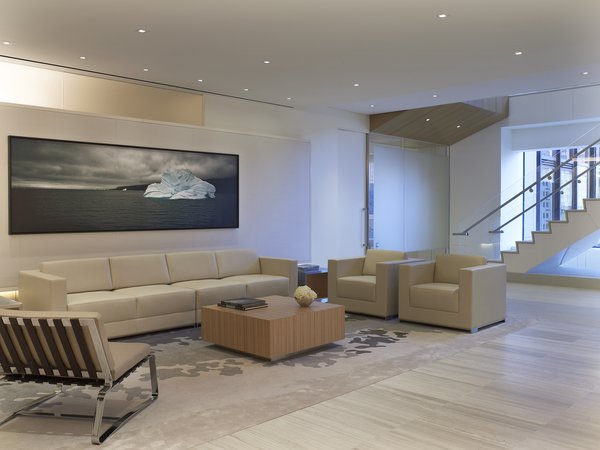 An interior by Rottet Studio, featuring a piece by Camille Seamon.
An interior by Rottet Studio, featuring a piece by Camille Seamon.
ENTER A WHOLE NEW DIMENSION
"When searching for an artwork to help expand an otherwise small space, you need to look for pieces that have dimensions themselves. For example, these works by Andrew Moore create the illusion that you can walk right into the photograph. By placing them in a 'dead end' position within your space—such as the end of a corridor—it will appear as if the room continues infinitely."
"Candida Höfer’s piece can also provide this effect, with the added bonus of a pop of bright color. Using a 'warmer' work as a feature within a room with colder tones—or vice versa—attracts attention and tricks the mind, allowing you to be transported from your physical surroundings."
TAKE A JOURNEY WITHOUT LEAVING YOUR LIVING ROOM
"Choosing a calming piece is largely about finding softer colors, but the meaning behind the piece is equally important. For example, Thomas Ruff’s jpeg ib02 can help drastically calm a static environment because the piece emotionally transports you to a peaceful setting—calm, cool waters and blue skies."
"John Baldessari’s Brain/Cloud is an equally calming representation of the beach lifestyle, complete with palm trees, beautiful weather, and your head in the clouds. Although these two pieces present dramatically different settings, both can utilized for their soothing qualities."
ABSTRACTION IS A BLANK WALL'S BEST FRIEND
"We often use photography for its transportive effect, but we also find that abstract art, both geometric and expressionist in nature, can add dimensions that tend to trick the eye. Sometimes we hang a small piece like Judy Ledgerwood’s Don Julio asymmetrically, leaving the wall otherwise blank to make the whole room feel larger. Smart and considered placement can make the space around the art feel more expansive and interesting."
rottet studio's light and space collection
RELATED ARTICLES
Thursday, May 12, 2016
What small-businesses owners might wish to know about Mr Trump
Donald Trump and small business
Scourge, not saviour
What small-businesses owners might wish to know about Mr Trump
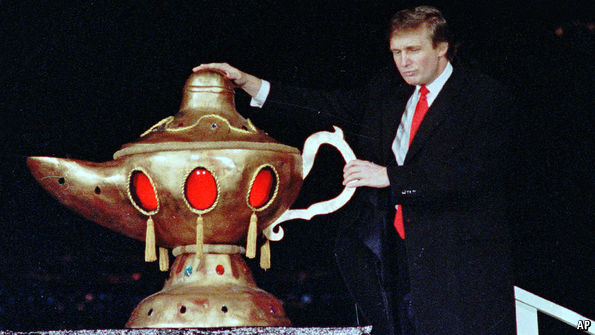 Insert crude joke here
Insert crude joke here“HE ALMOST bankrupted us,” says the retired owner of a construction business on the east coast. Thirty years ago he ran a small business with around ten employees, which was hired by Donald Trump to work on an 11-month project at his Taj Mahal casino in Atlantic City. It was the biggest contract, by far, that the business had ever had. The builders worked as they had never done before to complete the job on time. As soon as they finished, Mr Trump stopped paying. He owed around $200,000 of a bill totalling about $700,000, a huge sum for a small company.
What followed was a nearly year-long battle to extract the money it was owed. Lawyers advised the company that Mr Trump would procrastinate with expensive litigation, as he had done many times before. Other contractors relayed their experiences with the “Trump discount”, the billionaire’s habit of rarely paying the full sum he owed. As the “Trump discount” made the rounds in the industry, wily contractors quoted a higher price at the outset to avoid suffering any losses. Then, one day in 1988, the phone rang at 9.30am. A sweet-voiced special assistant of Mr Trump’s announced she had a cheque for the builders which, she claimed, had been lying on her desk for a year. “We only got paid because of Merv Griffin,” says the retired contractor. In a surprising swoop, Mr Griffin, an entertainment-business tycoon, had bought the company that owned the Taj Mahal.
Owners of small businesses are among Mr Trump’s most dedicated supporters. They believe his biggest selling point is his business acumen. He is a consummate dealmaker, they say, and has made heaps of money, maybe as much as $10 billion. They also like his proposal to slash the corporate income-tax rate from 35% to 15%. A poll earlier this year by Manta, an online directory for small businesses, of 2,527 owners of small companies who were planning to vote in the primaries, found that 60% favoured Mr Trump as the Republican candidate.
Bryant Simon of Temple University, who wrote a history of Atlantic City, marvels at how the author of “The Art of the Deal” sells his failure there as a great success. Mr Trump paid too much to finance the Taj with junk bonds; he also overpaid for the casino’s interior, whose mirrors and chandeliers made the palace of Versailles look unadorned. Even though the Taj was the highest-earning casino in America for a while it could not cover its debt.
Even more impressive business accomplishments do not readily translate into success in the White House. Presidents who cut their teeth in business are among the least successful and least popular of the 43, according to the Siena College Research Institute (SRI), which ranks presidents in 20 areas such as integrity, intelligence, willingness to take risks and leadership ability. Harry Truman is the only president with business experience who ranks highly, says Don Levy, director of the SRI. (Truman, a former haberdasher, ranks ninth.) Warren Harding, a newspaper publisher, comes bottom, at 43. Calvin Coolidge, a corporate lawyer, ranks a lowly 29th and Herbert Hoover, who had a career in the mining industry, comes in at 36.
Those businessmen who became presidents eased into politics slowly. After making money in the oil business, George H.W. Bush served for years in Congress, as ambassador to the UN and as boss of the CIA. His son, George W., also started out in the oil business and then, after a false start when he lost a House race, was elected governor of Texas at the first attempt.
Some companies are considering skipping the Republican convention in Cleveland. Presented with a choice of Trump v Clinton, the owner of the construction business that worked on the Taj would set aside his dislike of Mrs Clinton and vote for her. The Clinton campaign can look forward to plenty more stories like this from those who have worked with Mr Trump during his freewheeling career.
bizzzou
http://www.forbes.com/sites/richardbehar/2016/05/11/inside-israels-secret-startup-machine/?nl=entrepreneurship&emc=edit_sb_20160511#6d62d6f7157d
 Insert crude joke here
Insert crude joke here
“HE ALMOST bankrupted us,” says the retired owner of a construction business on the east coast. Thirty years ago he ran a small business with around ten employees, which was hired by Donald Trump to work on an 11-month project at his Taj Mahal casino in Atlantic City. It was the biggest contract, by far, that the business had ever had. The builders worked as they had never done before to complete the job on time. As soon as they finished, Mr Trump stopped paying. He owed around $200,000 of a bill totalling about $700,000, a huge sum for a small company.
What followed was a nearly year-long battle to extract the money it was owed. Lawyers advised the company that Mr Trump would procrastinate with expensive litigation, as he had done many times before. Other contractors relayed their experiences with the “Trump discount”, the billionaire’s habit of rarely paying the full sum he owed. As the “Trump discount” made the rounds in the industry, wily contractors quoted a higher price at the outset to avoid suffering any losses. Then, one day in 1988, the phone rang at 9.30am. A sweet-voiced special assistant of Mr Trump’s announced she had a cheque for the builders which, she claimed, had been lying on her desk for a year. “We only got paid because of Merv Griffin,” says the retired contractor. In a surprising swoop, Mr Griffin, an entertainment-business tycoon, had bought the company that owned the Taj Mahal.
Owners of small businesses are among Mr Trump’s most dedicated supporters. They believe his biggest selling point is his business acumen. He is a consummate dealmaker, they say, and has made heaps of money, maybe as much as $10 billion. They also like his proposal to slash the corporate income-tax rate from 35% to 15%. A poll earlier this year by Manta, an online directory for small businesses, of 2,527 owners of small companies who were planning to vote in the primaries, found that 60% favoured Mr Trump as the Republican candidate.
Bryant Simon of Temple University, who wrote a history of Atlantic City, marvels at how the author of “The Art of the Deal” sells his failure there as a great success. Mr Trump paid too much to finance the Taj with junk bonds; he also overpaid for the casino’s interior, whose mirrors and chandeliers made the palace of Versailles look unadorned. Even though the Taj was the highest-earning casino in America for a while it could not cover its debt.
Even more impressive business accomplishments do not readily translate into success in the White House. Presidents who cut their teeth in business are among the least successful and least popular of the 43, according to the Siena College Research Institute (SRI), which ranks presidents in 20 areas such as integrity, intelligence, willingness to take risks and leadership ability. Harry Truman is the only president with business experience who ranks highly, says Don Levy, director of the SRI. (Truman, a former haberdasher, ranks ninth.) Warren Harding, a newspaper publisher, comes bottom, at 43. Calvin Coolidge, a corporate lawyer, ranks a lowly 29th and Herbert Hoover, who had a career in the mining industry, comes in at 36.
Those businessmen who became presidents eased into politics slowly. After making money in the oil business, George H.W. Bush served for years in Congress, as ambassador to the UN and as boss of the CIA. His son, George W., also started out in the oil business and then, after a false start when he lost a House race, was elected governor of Texas at the first attempt.
Some companies are considering skipping the Republican convention in Cleveland. Presented with a choice of Trump v Clinton, the owner of the construction business that worked on the Taj would set aside his dislike of Mrs Clinton and vote for her. The Clinton campaign can look forward to plenty more stories like this from those who have worked with Mr Trump during his freewheeling career.
Donald Trump and small business
Scourge, not saviour
What small-businesses owners might wish to know about Mr Trump
 Insert crude joke here
Insert crude joke here“HE ALMOST bankrupted us,” says the retired owner of a construction business on the east coast. Thirty years ago he ran a small business with around ten employees, which was hired by Donald Trump to work on an 11-month project at his Taj Mahal casino in Atlantic City. It was the biggest contract, by far, that the business had ever had. The builders worked as they had never done before to complete the job on time. As soon as they finished, Mr Trump stopped paying. He owed around $200,000 of a bill totalling about $700,000, a huge sum for a small company.
What followed was a nearly year-long battle to extract the money it was owed. Lawyers advised the company that Mr Trump would procrastinate with expensive litigation, as he had done many times before. Other contractors relayed their experiences with the “Trump discount”, the billionaire’s habit of rarely paying the full sum he owed. As the “Trump discount” made the rounds in the industry, wily contractors quoted a higher price at the outset to avoid suffering any losses. Then, one day in 1988, the phone rang at 9.30am. A sweet-voiced special assistant of Mr Trump’s announced she had a cheque for the builders which, she claimed, had been lying on her desk for a year. “We only got paid because of Merv Griffin,” says the retired contractor. In a surprising swoop, Mr Griffin, an entertainment-business tycoon, had bought the company that owned the Taj Mahal.
Owners of small businesses are among Mr Trump’s most dedicated supporters. They believe his biggest selling point is his business acumen. He is a consummate dealmaker, they say, and has made heaps of money, maybe as much as $10 billion. They also like his proposal to slash the corporate income-tax rate from 35% to 15%. A poll earlier this year by Manta, an online directory for small businesses, of 2,527 owners of small companies who were planning to vote in the primaries, found that 60% favoured Mr Trump as the Republican candidate.
Bryant Simon of Temple University, who wrote a history of Atlantic City, marvels at how the author of “The Art of the Deal” sells his failure there as a great success. Mr Trump paid too much to finance the Taj with junk bonds; he also overpaid for the casino’s interior, whose mirrors and chandeliers made the palace of Versailles look unadorned. Even though the Taj was the highest-earning casino in America for a while it could not cover its debt.
Even more impressive business accomplishments do not readily translate into success in the White House. Presidents who cut their teeth in business are among the least successful and least popular of the 43, according to the Siena College Research Institute (SRI), which ranks presidents in 20 areas such as integrity, intelligence, willingness to take risks and leadership ability. Harry Truman is the only president with business experience who ranks highly, says Don Levy, director of the SRI. (Truman, a former haberdasher, ranks ninth.) Warren Harding, a newspaper publisher, comes bottom, at 43. Calvin Coolidge, a corporate lawyer, ranks a lowly 29th and Herbert Hoover, who had a career in the mining industry, comes in at 36.
Those businessmen who became presidents eased into politics slowly. After making money in the oil business, George H.W. Bush served for years in Congress, as ambassador to the UN and as boss of the CIA. His son, George W., also started out in the oil business and then, after a false start when he lost a House race, was elected governor of Texas at the first attempt.
Some companies are considering skipping the Republican convention in Cleveland. Presented with a choice of Trump v Clinton, the owner of the construction business that worked on the Taj would set aside his dislike of Mrs Clinton and vote for her. The Clinton campaign can look forward to plenty more stories like this from those who have worked with Mr Trump during his freewheeling career.
Subscribe to:
Posts (Atom)

 Palace Square (2000) by Andrew Moore, available on Artspace
Palace Square (2000) by Andrew Moore, available on Artspace 






